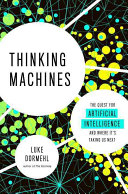2018 School Spending Survey Report
Thinking Machines: The Quest for Artificial Intelligence—and Where It's Taking Us Next
Tarcher. Mar. 2017. 288p. notes. index. ISBN 9780143130581. $16; ebk. ISBN 9781524704414. TECH
COPY ISBN
VERDICT For anyone interested in developments in the field of artificial intelligence, and a worthwhile acquisition for most libraries.
RELATED
ALREADY A SUBSCRIBER? LOG IN
We are currently offering this content for free. Sign up now to activate your personal profile, where you can save articles for future viewing




Comment Policy:
Comment should not be empty !!!